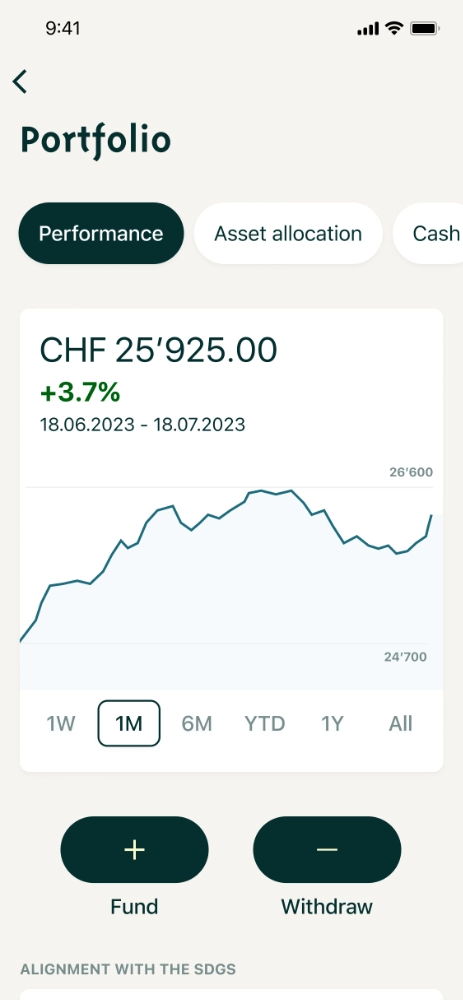Radicant Review 2024 – Pros & Cons
| Updated: |(Disclosure: Some of the links below may be affiliate links)
Radicant is a new digital bank with banking and investment features. It is a subsidiary of Basel Land Kantonal Bank and aims to be the most sustainable digital bank in Switzerland.
In this review, we will see precisely what is radicant and how it compares with similar offers. By the end of this review, you will know whether you should use Radicant.
| Monthly fee | 0 CHF |
|---|---|
| Users | N/A |
| Card | Virtual Visa Debit |
| Currencies | CHF |
| Withdrawals in Switzerland | 12 Free per year, then 2 CHF |
| Withdrawals abroad | 5.0 CHF |
| Currency exchange fee | 0.00% |
| Investing fees | 0.90% – 1.30% |
| Languages | English, and German |
| Custody bank | Radicant |
| Depositor protection | 100’000 CHF |
| Established | 2023 |
| Headquarters | Zürich, Switzerland |
Radicant

Radicant was created as a subsidiary of the Basel Land Kantonal Bank (BLKB). However, they act independently. In 2023, Radicant got a banking license from FINMA.
A beta was launched in March 2023. In August 2023, the app was launched to the public.
Radicant is only available as a mobile app on Android and iPhone. They claim they are 100% in the cloud (in Google Cloud, Zurich, with a backup in Frankfurt). They want to break even by 2026.
Currently, the app is only available in German and English.
So, let’s see what features and fees this new digital bank account offers its users.
Banking Features
First, we should look at the banking features.
Radicant offers all the essential features that each bank account provides:
- Receive and send money to other bank accounts
- Pay your bills
- View your balance and transactions
On top of that, the rest of the features are focused on mobile banking:
- Google Pay
- Apple Pay
- TWINT
In November 2023, they added support for electronic bills.
It is interesting to note that this account does not come with a physical card by default. Since they focus on sustainability, the account comes with a virtual Visa debit card. However, you can order a physical Visa debit card, which will be made of recycled plastic.
As of March 2024, you will get a 1.25% interest rate on your cash, up to 250,000 CHF. After that, you will get a 1% interest rate.
It is also probably worth noting that some of the cash deposited at this bank will be invested in green bonds. The idea is that your deposits will support sustainable projects worldwide.
You also get a carbon footprint tracker as a small utility. It is not useful for me since it can only track a portion of your expenses. But it is a start, and some people may like these features.
Radicant proposes all the features most people need in a bank account.
Investing features

Radicant offers investing features as well, directly from the app.
Radicant focuses solely on sustainable investing. Interestingly, they are using different factors than other companies. Instead of using the standard ESG criteria, Radicant uses Sustainable Development Goals (SDGs) as criteria. These criteria are developed by the United Nations (UN). There are 17 SDGs as of this day. Here are a few examples:
- Gender Equality
- Child Health
- Zero Hunger
- Sustainable cities
- Peace
To make sure their investment products are following these goals accurately, Radicant has developed its own products. These funds are managed by Radicant and issued by other banks, such as the Zurcher Kantonal Bank (ZKB). Currently, they have eight investment products, covering up to 3 SDGs for each fund. Here are a few examples again:
- Societal Progress
- Gender Equality
- Healthy Ecosystems
On top of that, portfolios also invest in wider funds managed by Radicant:
- Global Sustainable Equities
- Global Sustainable Bonds
- Swiss Sustainable Equities
Interestingly, they are only using their own funds.
Portfolios are made based on your impact and investment focuses. You can choose whether to focus on the world or Switzerland. Based on your risk profile, you will be assigned one of five strategies:
- Cautious: 20% stocks
- Conservative: 40% stocks
- Balanced: 60% stocks
- Dynamic: 80% stocks
- Growth: 98% stocks
Investing up to 98% in stocks is a great thing. And you can start to invest with a minimum of 1000 CHF.
Overall, the investing features are good. Since they only focus on sustainable investment, these features are only suited for investors who want to focus on sustainable investing. The SDGs also look a bit too complicated, but they also seem more ambitious than simple ESG goals.
These features make Radicant work like a Robo-advisor, not a broker. This is important because many banks will act like brokers but not Robo-advisors.
Banking fees
The fees for the banking features of Radicant are pretty simple.
The good thing is that there are no base management fees. So, you will not pay anything to keep your account open. Paying your bills and doing bank transfers in Switzerland is free, as is mobile payment in CHF in Switzerland.
If you want the physical Visa debit card, you must pay 10 CHF.
If you want to withdraw CHF, you get 12 free annual withdrawals in Switzerland. After this, you will pay 2 CHF per CHF withdrawal in Switzerland. If you withdraw abroad, you will pay 5 CHF, and if you withdraw EUR in Switzerland, you will also pay 5 CHF.
If you pay abroad or in foreign currencies with your card (virtual or physical), Radicant will use the Visa exchange rate. On average, this exchange rate is about 0.60% worse than the interbank exchange rate.
On top of it, Radicant has no surcharge. This makes a total fee of 0.60%. This is an excellent rate as far as Swiss banks go!
These fees are fair, but I would not recommend Radicant for paying in foreign currencies or abroad.
Investing fees
We can now look at the investing fees of Radicant.
Radicant has a management fee based on the invested amount:
- 0.90% per year from 1000 CHF to 24’999 CHF
- 0.80% per year from 25’000 CHF to 99’999 CHF
- 0.65% per year from 100’000 CHF to 249’999 CHF
- 0.50% per year from 250’000 CHF
Moreover, we must add the product costs. Based on your portfolio, these will vary from 0.40% to 0.47%.
For their launch, they offer a 50% discount on the account fees if you invest until the end of January 2024. This only reduces the management fee, not the product costs.
Here is a summary of all the total fees, with and without the discount:
| Portfolio | Total Fee without discount | Total Fee with discount |
|---|---|---|
| 1’000 to 24’999 | 1.30% – 1.37% | 0.85% – 0.92% |
| 25’000 to 99’999 | 1.20% – 1.27% | 0.80% – 0.87% |
| 100’000 to 249’999 | 1.05% – 1.12% | 0.725% – 0.795% |
| From 250’000 | 0.90% – 0.97% | 0.65% – 0.72% |
Overall, I feel like the fees with the discount are good for a Robo-advisor investing sustainably. However, the fees without discount are pretty high. There are many cheaper alternatives, even for sustainable investing.
The good thing about these fees is that they are very transparent and simple.
Alternatives
We should look at some alternatives and compare them with Radicant. It is difficult to compare since Radicant is both a bank and a Robo-advisor. Since I do not know any other service that does both, we will compare it with a bank and a Robo-advisor.
Radicant vs Neon
All the services you need to pay, save and invest, in a neat package, with extremely good prices!
Use the poorswiss code to receive 10CHF!
- Pay abroad for free
- Invest with great fees
First, we can compare Radicant with Neon, another digital bank account.
Both bank accounts are free of any monthly charge. And all the basic features are free.
However, Neon has a SMALL advantage when spending abroad or in foreign currencies. Indeed, Neon will offer the Mastercard exchange rate without any surcharge. This makes about 0.40% total markup against 0.60% markup for Radicant. This makes Neon slightly cheaper for use abroad.
Neon also has the advantage of partnering with Wise to make outgoing transfers in foreign currencies. This will make bank transfers in foreign currencies significantly cheaper with Neon than Radicant.
Neon also offers investing services, but as a broker, not as a Robo-advisor, so comparing them does not make sense.
Overall, Neon is a better digital bank account than Radicant. It may not have sustainability features for your deposited cash, but I do not think this makes a significant difference. Neon is cheaper on several counts and has more features.
Radicant vs Inyova
A very good Robo-Advisor, with a strong focus on impact investing and sustainable investments.
- Very sustainable
- Affordable for large portfolios
We can also compare Radicant and Inyova, another Robo-advisor focusing on sustainability.
As far as I know, Inyova is the most sustainable Robo-advisor available in Switzerland. It makes it a good candidate for comparison with Radicant.
They have different approaches to sustainability. Inyova focuses on impact investing with a focus on both the handprint and footprint of companies. Radicant focuses on the UN Sustainable Development Goals. I cannot say which is the most sustainable. They are probably on the same level.
One significant difference is that Inyova uses single shares they picked, while Radicant uses managed funds. This allows a greater level of customization for Inyova’s portfolio.
Inyova has the following management fee based on the invested value:
- Below 50’000 CHF: 1.2% annual fee
- Between 50’000 and 150’000 CHF: 1.0% annual fee
- Between 150’000 and 500’000 CHF: 0.8% annual fee
- Above 500’000 CHF: 0.6% annual fee
Since Inyova invests in single stocks, there is no extra product cost.
The fees depend on the starting discount. With the discount (until January 2024), Radicant is slightly cheaper than Inyova. On the other hand, without the discount, Inyova is cheaper than Radicant. The last tier of fees at Inyova, starting at 500’000 CHF, would make it more affordable than Radicant, regardless of the discount.
Given that Inyova is a more established Robo-advisor and its fees are better generally, I would recommend Inyova. Radicant may be interesting if you are especially interested in UN SDGs and can get discounted fees.
FAQ
What is the minimum amount to invest with Radicant?
The minimum is 1000 CHF.
Is Radicant a broker?
No, they have investing features like Robo-advisor, but you cannot choose your shares.
How much does it cost to pay abroad with Radicant?
You will pay 0.80% fee to Radicant, on top of the Visa exchange rate, which is about 0.6% worse than the interbank rate. Therefore, you pay about 1.40% fee on these operations.
Who is Radicant good for?
Radicant is interesting if you want both a bank account and a Robo-advisor on the same service.
Who is Radicant not good for?
Radicant is not great if you want the cheapest bank account or Robo-advisor. And it is not the most sustainable choice.
Summary

Radicant is a digital bank with Robo-advisor features, focusing on sustainability.
Product Brand: Radicant
3
Radicant Pros
Let's summarize the main advantages of Radicant:
- Transparent pricing
- No monthly management fee for the bank account
- Good discount for starting
- Deep focus on sustainability
- Good fees for paying abroad
Radicant Cons
Let's summarize the main disadvantages of Radicant:
- Expensive investing fees without the discount
- Can only invest sustainably
- Limited choices for investing
Conclusion
Overall, it is interesting to see a new digital bank account with a strong focus on sustainability. It is also interesting to see that it does not focus on ESG but on the UN Sustainable Development Goals instead.
On the other hand, I fail to see the market for Radicant. As a bank account, it is not as attractive as other established bank accounts like Neon or Yuh.
As a Robo-advisor, I know that it offers few advantages over other services. Compared with a sustainable Robo-advisor, it does not provide a significant advantage. And when compared with a cheap Robo-advisor, its fees are not good enough.
If you are looking for outstanding digital bank accounts or Robo-advisors, you can read these two reviews:
What do you think about this new product? Where do you think it fits in the current market?
Download this e-book and optimize your finances and save money by using the best financial services available in Switzerland!
Download The FREE e-bookRecommended reading
- More articles about Best banks
- More articles about Save
- Zak vs Neon: Best Swiss digital bank account in 2024?
- Zürcher Kantonal Bank (ZKB) Review 2024
- Wise Review 2024 – Pros & Cons



Hey Baptiste, radicant uses from today on the interbank exchange rate without any additional fee, which makes it the best Prepaid-Credit Card available for foreign currency purchases. So that means radicant beats, Revolut, Neon and Alpian+.
Ignore the „study“, but the statement that they use the plain interbank exchange rate without any surcharge is the keypoint:
https://www.radicant.com/blog/knowledge-hub/comparative-analysis-of-foreign-exchange-rates-with-swiss-debit-and-credit-cards/
Thanks for sharing, I will have to update the article.
I am not convinced they have an interbank exchange rate since they use Visa. On average, Visa is slightly worse than Mastercard for that. I will need to research it more.
I was aslo thinking they will just fool us and use the Visa rference rate, but several times on their pages they state things like this:
„The mid-market rate is the average between the buy and sell prices of two currencies in the foreign exchange market. When banks or transfer services trade, they are using the mid-market rate as the fairest exchange rate. The mid-market is rarely applied for end-clients, but with radicant it is. “
So, I am quite optimistic now.
Interesting indeed. And this is consistent with their example. However, we should still be careful because they did their analysis on a single day, so not really strong evidence.
Baptiste, I’d like to use your Radicant code to reward you for your great content. Could you provide it to me?
Hi Ricardo
Thanks, but I do not have any Radicant code.
Is CEA webpage in English? Just to check their conditions
No, they are not even available in German, only in French.
For me, the 1% interest on my Account balance could make it interesting as an account for my emergency funds. In principle, i could get similar returns with Neon Spaces too at 0.9%.
Hi Rasta,
Yes, some interest rate is good on your emergency fund. I personally use Neon Spaces for that. But there are better places, such as willbe at 1.55%. And some banks are offering up to 2% these days if you transfer money from another bank.
Interesting, what are the options for >1% interest banks?
CEA is at 2% I believe, willbe at 1.55% and I thougth I saw something from UBS offering 2% but only from money from other banks.